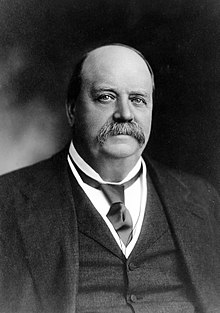G H Reid
|
The Right Honourable Sir George Reid GCB, GCMG, KC |
|
|---|---|
 |
|
| 4th Prime Minister of Australia Elections: 1901, 1903, 1906 |
|
|
In office 18 August 1904 – 5 July 1905 |
|
| Monarch | Edward VII |
| Governor-General | Lord Northcote |
| Preceded by | Chris Watson |
| Succeeded by | Alfred Deakin |
| Leader of the Opposition | |
|
In office 19 May 1901 – 17 August 1904 |
|
| Prime Minister |
Edmund Barton Alfred Deakin Chris Watson |
| Preceded by | New position |
| Succeeded by | Chris Watson |
|
In office 7 July 1905 – 16 November 1908 |
|
| Prime Minister | Alfred Deakin Andrew Fisher |
| Preceded by | Chris Watson |
| Succeeded by | Joseph Cook |
|
12th Premier of New South Wales Elections: 1894, 1895, 1898 |
|
|
In office 3 August 1894 – 13 September 1899 |
|
| Monarch | Victoria |
| Governor |
Sir Robert Duff Lord Hampden |
| Preceded by | George Dibbs |
| Succeeded by | William Lyne |
| Leader of the Free Trade Party | |
|
In office 18 November 1891 – 16 November 1908 |
|
| Preceded by | Henry Parkes |
| Succeeded by | Joseph Cook |
| High Commissioner to the United Kingdom | |
|
In office 1 January 1910 – 1 January 1916 |
|
| Preceded by | New position |
| Succeeded by | Andrew Fisher |
| Member of the Australian Parliament for East Sydney | |
|
In office 30 March 1901 – 13 April 1910 |
|
| Preceded by | Constituency Created |
| Succeeded by | John West |
| Member of the Parliament of the United Kingdom for St George's, Hanover Square | |
|
In office 11 January 1916 – 12 September 1918 |
|
| Preceded by | Sír Alexander Henderson |
| Succeeded by | Sir Newton Moore |
| Member of the New South Wales Parliament for East Sydney |
|
|
In office 14 December 1880 – 3 August 1884 Serving with Arthur Renwick; Henry Parkes; Henry Dangar; Edmund Barton; John McElhone; George Griffiths; Henry Copeland |
|
| Preceded by | John Davies |
| Succeeded by | Sydney Burdekin |
|
In office 2 March 1887 – 3 August 1894 Serving with Edmund Barton; John McElhone; George Griffiths; Henry Copeland; Sydney Burdekin; John Street; George Griffiths; William McMillan; Walter Bradley; Varney Parkes |
|
| Preceded by | George Griffiths |
| Succeeded by | District Abolished |
| Member of the New South Wales Parliament for Sydney-King |
|
|
In office 3 August 1894 – 30 March 1901 |
|
| Preceded by | Constituency Created |
| Succeeded by | Ernest Broughton |
| Personal details | |
| Born |
25 February 1845 Johnstone, Renfrewshire, Scotland |
| Died | 12 September 1918 (aged 73) London, England |
| Resting place |
Putney Vale Cemetery 51°26′26″N 0°14′21″W / 51.440426°N 0.239237°W |
| Political party | None (before 1887) Free Trade (1887–1909) Liberal (1909–1910) Unionist (after 1913) |
| Spouse(s) | Florence Brumby (m. 1891; wid. 1918) |
| Children | 3 |
| Education | Scotch College |
| Profession | Civil servant, barrister |
Sir George Houstoun Reid GCB, GCMG, KC (25 February 1845 – 12 September 1918) was an Australian politician who led the Reid Government as the fourth Prime Minister of Australia from 1904 to 1905, having previously been Premier of New South Wales from 1894 to 1899. He led the Free Trade Party from 1891 to 1908.
Reid was born in Johnstone, Renfrewshire, Scotland. He and his family immigrated to Australia when he was young. They initially settled in Melbourne, but moved to Sydney when Reid was 13, at which point he left school and began working as a clerk. He later joined the New South Wales civil service, and rose through the ranks to become secretary of the Attorney-General's Department. Reid was also something of a public intellectual, publishing several works in defence of liberalism and free trade. He began studying law in 1876 and was admitted to the bar in 1879. In 1880, he resigned from the civil service to run for parliament, winning election to the New South Wales Legislative Assembly.
From 1883 to 1884, Reid served as Minister for Public Instruction in the government of Alexander Stuart. He joined the Free Trade Party of Henry Parkes in 1887, but refused to serve in Parkes' governments due to personal enmity. When Parkes resigned as party leader in 1891, Reid was elected in his place. He became premier after the 1894 election and remained in office for just over five years. Despite never winning majority government, Reid was able to pass a number of domestic reforms concerning the civil service and public finances. He was an advocate of federation and played a part in drafting the new constitution, where he became known as a strong defender of his colony's interests. In 1901, he was elected to the new federal parliament representing the Division of East Sydney.
...
Wikipedia
